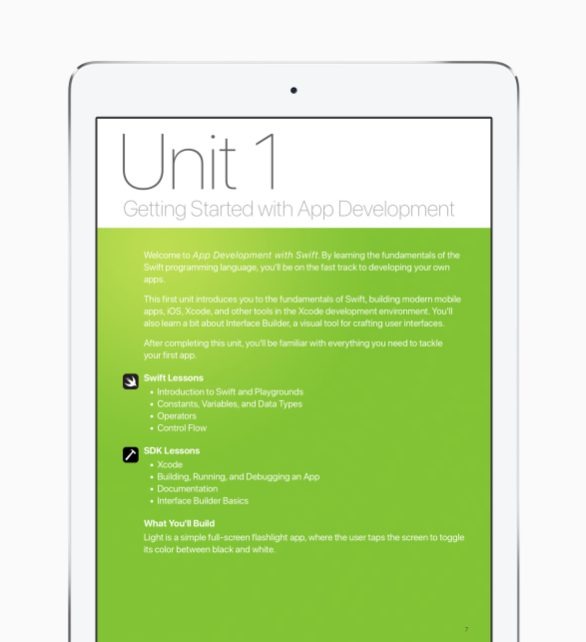Apple on Wednesday released "App Development with Swift," a free course available through the iBooks Store, which will also be coming to a handful of U.S. schools at the beginning of the fall semester.
The iBooks course is a full-year endeavor geared towards helping people "design fully functional apps, gaining critical job skills in software development and information technology," according to Apple. Swift is Apple's open-source programming language that works across iOS, macOS, watchOS, and tvOS.
In the fall, six colleges will begin teaching the iBooks material: the Alabama Community College System, Columbus State Community College, Harrisburg Area Community College, Houston Community College, Mesa Community College and the San Mateo Community College District. HCC is in fact opening an iOS Coding and Design School, Apple noted.
"Select" high schools will simultaneously add it to their curricula, but Apple has yet to identify them by name.
App Development with Swift is a part of Apple's broader Everyone Can Code program, which the company noted will see materials used in over 1,000 U.S. schools this fall.
Encouraging Swift development likely has multiple benefits for Apple. In general it should foster the creation of more apps for its platforms, but in the long run it may also build up a potential workforce and further cement Swift and Apple platforms as a standard.
 Roger Fingas
Roger Fingas








 Brian Patterson
Brian Patterson
 Charles Martin
Charles Martin


 Malcolm Owen
Malcolm Owen
 William Gallagher
William Gallagher
 Christine McKee
Christine McKee
 Marko Zivkovic
Marko Zivkovic









33 Comments
A cheaper workforce is more like it.
The race to the bottom of cheap apps has proven to me people want cheap software, not professional software in a lot of cases. I can see games and "play apps" being written by those who are not properly trained and are SO warriors.
I think this is good for everyone though. The more exposure that Swift gets, the more implanted future it will have. Not just in the iOS and Mac world, but the open source linux world as well. I'm quite excited to see it take off in the server side and machine learning world.
I think offering these classes as tech electives is great! There are too many colleges that think that C++ is still a dominating factor. I have seen some that still teach Pascal! Hopefully this helps start moving the bar for more modern languages and frameworks.
Free course materials... To make it easier for you to proudly train your "Fresher" H1-B replacement.